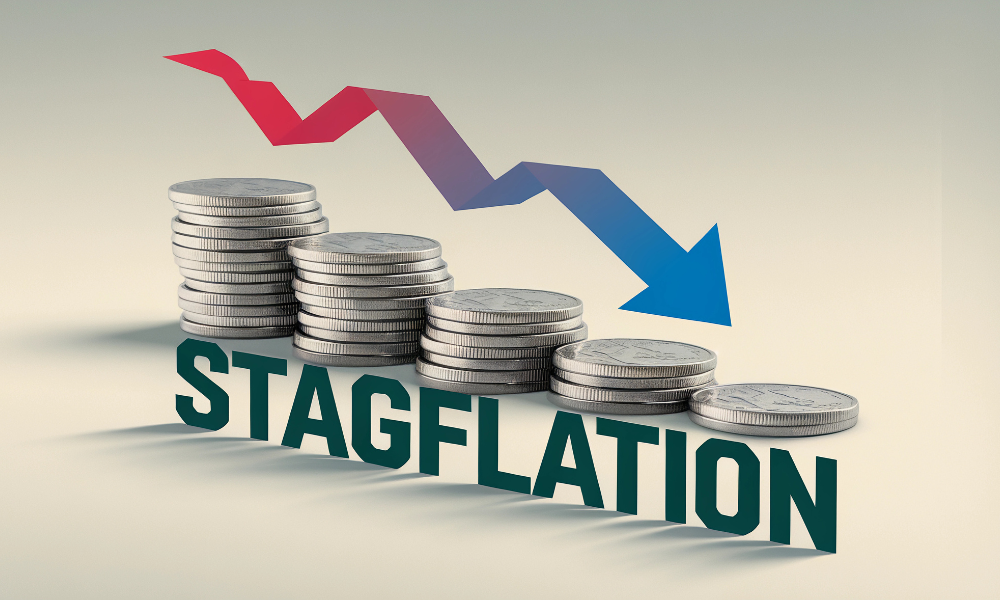Business and consumer adaption to tariffs reducing risk of inflation

As the impacts of US President Donald Trump’s global trade policy continue to send shockwaves to markets and central banks alike, many are concerned that stagflation will become the latest hurdle in a long list of investor concerns.
But Colin White suggests that these worries have been exaggerated, pointing to resilience from industries that have already adapted to Trump’s policies by pricing in tariffs to their products.
Stagflation occurs when economic growth stutters and inflation soars at the same time. Fears over stagflation have heightened recently as worries over the potential inflationary impacts of Trump’s tariffs could meet a Canadian economy that has remained sluggish over the last year.
White dubs stagflation as a “bogeyman,” saying the assumption of stagflation is “based on a very basic calculation that these tariffs are going to raise prices, and that's going to be inflationary and curb growth.”
According to White, the immediate reactions from businesses and consumers provide an indication that concern over stagflation is unwarranted. Last month’s StatsCan inflation figures were down year-over-year after consumer spending on US-bound flights decreased. He also says that the prediction of stagflation based on Trump’s tariffs holds little weight as the predication is made on long-term prospects, though Trump’s policies change rapidly and unexpectedly.
“It’s a fairly simple line of logic that's being applied, and global economics is way more complicated than that,” said White, CEO and portfolio manager at Verecan. “These tariffs that are being put in place are not consistent, they're not necessarily long term and you're seeing them change some days by the minute.”
White suggests that those with globally diversified portfolios will be able to weather this economic storm, pointing particularly to Western European and developed Asian markets. He also says that outside the arguably saturated Mag 7 sector of the US market, there are still opportunities to find undervalued assets that have been able to withstand this year’s unprecedented volatility.
“For first time in a while, the European markets and Asian markets and Canadian markets are outperforming US markets. For somebody who bought into the fact the US is always number one, now they’re feeling some pain,” he said. “The global economy is going to sort this out. Individual countries are going to go through their cycles, but somewhere on the planet, somebody is going to be making the food that we need, somebody is going to be making the stuff that we want to buy.”
Pivots to price in tariffs have already occurred in most international companies, according to White, who says the inflationary pressures of tariffs will not be as impactful as initially expected.
“I've spoken with at least a dozen CEOs of international companies where they're just pivoting now, they're changing where stuff is produced and they're changing their supply lines,” he said. “The premise that these tariffs are going to be some kind of a number that you can calculate isn't true, because the companies affected by these tariffs are changing the way they're doing business to avoid or mitigate the impact of the tariffs.”
While White does not believe stagflation is imminent, he has seen an increase in clients looking for access to liquidity as the toll of tariffs and a long-suffering Canadian economy take hold. For advisors with clients looking for extra liquid cash, White suggests setting up a high interest savings account with one to two years of income to create a cash wedge that can be boosted if needed. He emphasizes the need to remain in close contact with clients, as market conditions or personal circumstances may shift the amount of liquid cash required.
“Now might be a time where the client is changing their spending patterns. You have to talk to your clients, because many clients are deferring things like that trip to the US they were going to take either for financial reasons or for political reasons,” he said. “Don't leave yourself in a position where you're illiquid, or where money you're planning on spending this year or next is exposed to the market undulations.”
Talks of an imminent recession have also grown louder, but White points to the same discussion occurring in 2023, though no recession occurred. He reiterates the importance of holding trust in a globally diversified portfolio, rather than overhauling a portfolio for an event that is speculative.
“If you think this is going to happen for sure and you set your portfolio up based on that assumption, you've taken a huge risk,” he said.
With regards to the Canadian economy, White says the past year has given investors little reason for optimism, pointing to the high levels of consumer debt and oil prices remaining low. He says there is room for tailwinds from newly-elected Prime Minister Mark Carney, though worries the former central banker’s Trudeau-era cabinet may be resistant to some of his business-friendly policies. Tax policy should be a major priority to the new government according to White, who says the implementation of income tax laws have been severely disappointing.
“It'll be interesting to see how much change he's actually able to affect, whether he's going to be able to maintain his support within the party if he tries to stray too far from the path that they've been on for the last little while,” he said. “We're really hoping that the new government cleans up its legislative writing policies, because the legislation that's been written specific to the income tax policy has been horrendous.”



